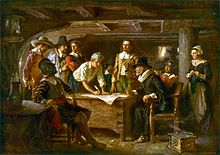Isaac Allerton

Isaac Allerton (c. 1560 – 1659) was born in England. In 1620, he travelled on the Mayflower with his wife, three children and apprentice John Hooke.[1][2]
Allerton belonged to the religion which was not allowed in England. In 1614 he and his family moved to Leiden Netherlands where he worked as a tailor. He married and had three children.
The Mayflower voyage
[change | change source]
The Allerton family and John Hooke, left Plymouth, England on 16 September 1620. There were 102 passengers and 30–40 crew. On 19 November 1620, the Mayflower spotted land. They had intended to go to Virginia Colony but the ship was damaged so they landed at Cape Cod on 21 November. They wrote the Mayflower Compact, which made rules on how they would live and treat each other. Allerton signed the document.[3][4][5]
In Plymouth Colony
[change | change source]In the first year many people died from the cold weather and hunger including Allerton's wife and his apprentice. Allerton worked with Plymouth Governors to help save the colony.[6][7]
Starting in 1626, Allerton made many trips back and forth to England. The Mayflower passengers owed money to people in England who had helped pay for their voyage. Allerton was supposed to go to England and pay off some of this debt. Some of the people did not think that he was honest with the money. On one of his trips back from England, in 1630, Allerton came back without some of the supplies which they very much needed.[8]
In 1634, another sickness came to Plymouth Colony which caused many people to die including Allerton's second wife Fear.[9]
Allerton died in 1659 in New Haven, Connecticut. His first wife, Mary died in 1621 and was buried in Cole's Hill Burial Ground, Plymouth. The burial place of his second wife, Fear is unknown.[10][11]
References
[change | change source]- ↑ A genealogical profile of Isaac Allerton, (A collaboration between Plymouth Plantation and New England Historical Genealogical Society) [1] Archived 2013-03-19 at the Wayback Machine
- ↑ William Bradford, History of Plymouth Plantation by William Bradford, the second Governor of Plymouth (Boston:1856), p. 451
- ↑ Eugene Aubrey Stratton, Plymouth Colony: Its History and People, 1620-1691, (Salt Lake City: Ancestry Publishing, 1986), pp. 20, 411-413
- ↑ George Ernest Bowman, The Mayflower Compact and its signers, (Boston: Massachusetts Society of Mayflower Descendants, 1920). Photocopies of the 1622, 1646 and 1669 versions of the document pp. 7–19.
- ↑ George Ernest Bowman, The Mayflower Compact and its signers (Boston: Massachusetts Society of Mayflower Descendants, 1920). Photocopies of the 1622, 1646 and 1669 versions of the document pp. 7-19.
- ↑ Robert S. Wakefield, F.A.S.G. and Margaret Harris Stover, CG., Mayflower Families through Five Generations: Descendants of the Pilgrims who landed at Plymouth, Massachussetts December 1620, vol. 17: Family of Isaac Allerton p. 1
- ↑ Nathaniel Philbrick, Mayflower: A story of Courage, Community and War (New York:Viking, 2006), p. 103
- ↑ David Lindsay, PhD., Mayflower Bastard: A Stranger amongst the Pilgrims (New York: St. Martins Press, 2002), pp. 80-81
- ↑ Jacob Bailey Moore, Memoirs of American Governors (Washington 1846 pub. For subscribers) vol. 1, iv p. 139
- ↑ Memorial for Isaac Allerton
- ↑ Memorial for Mary Norris Allerton
